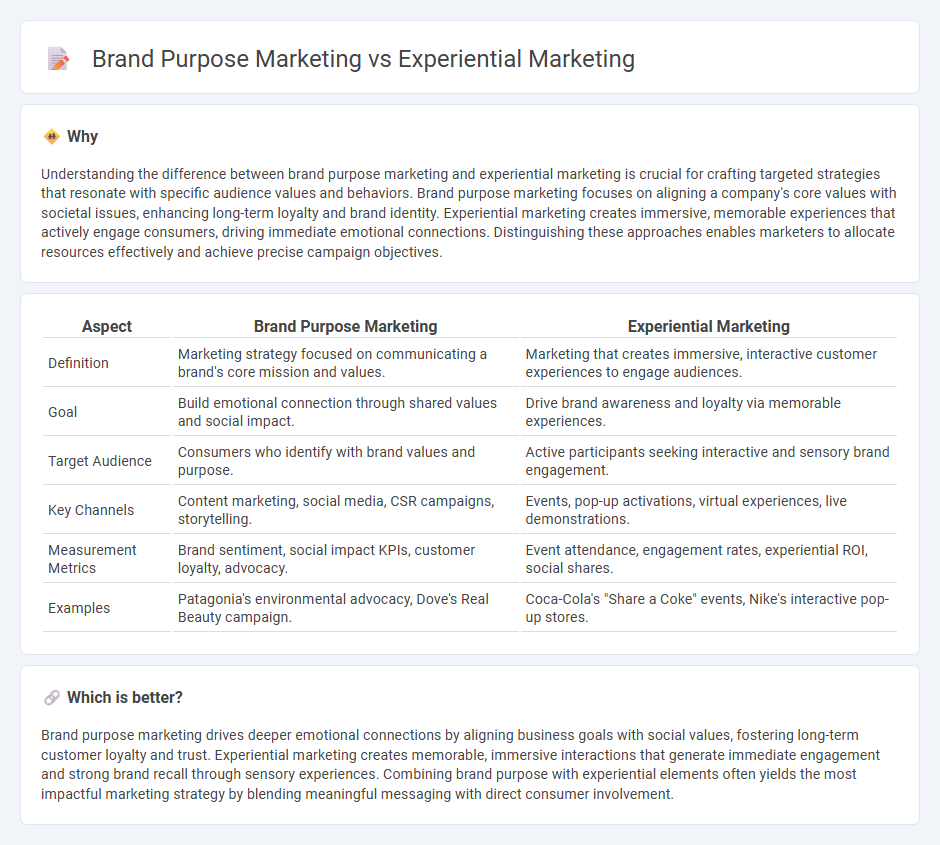
Brand purpose marketing centers on communicating a company's core values and social impact to build consumer trust and loyalty, while experiential marketing focuses on creating immersive, memorable experiences that directly engage customers with the brand. Both strategies aim to strengthen emotional connections but differ in approach: brand purpose marketing leverages meaningful narratives, whereas experiential marketing uses sensory interactions and events. Explore how integrating both can elevate your marketing effectiveness.
Why it is important
Understanding the difference between brand purpose marketing and experiential marketing is crucial for crafting targeted strategies that resonate with specific audience values and behaviors. Brand purpose marketing focuses on aligning a company's core values with societal issues, enhancing long-term loyalty and brand identity. Experiential marketing creates immersive, memorable experiences that actively engage consumers, driving immediate emotional connections. Distinguishing these approaches enables marketers to allocate resources effectively and achieve precise campaign objectives.
Comparison Table
| Aspect | Brand Purpose Marketing | Experiential Marketing |
|---|---|---|
| Definition | Marketing strategy focused on communicating a brand's core mission and values. | Marketing that creates immersive, interactive customer experiences to engage audiences. |
| Goal | Build emotional connection through shared values and social impact. | Drive brand awareness and loyalty via memorable experiences. |
| Target Audience | Consumers who identify with brand values and purpose. | Active participants seeking interactive and sensory brand engagement. |
| Key Channels | Content marketing, social media, CSR campaigns, storytelling. | Events, pop-up activations, virtual experiences, live demonstrations. |
| Measurement Metrics | Brand sentiment, social impact KPIs, customer loyalty, advocacy. | Event attendance, engagement rates, experiential ROI, social shares. |
| Examples | Patagonia's environmental advocacy, Dove's Real Beauty campaign. | Coca-Cola's "Share a Coke" events, Nike's interactive pop-up stores. |
Which is better?
Brand purpose marketing drives deeper emotional connections by aligning business goals with social values, fostering long-term customer loyalty and trust. Experiential marketing creates memorable, immersive interactions that generate immediate engagement and strong brand recall through sensory experiences. Combining brand purpose with experiential elements often yields the most impactful marketing strategy by blending meaningful messaging with direct consumer involvement.
Connection
Brand purpose marketing drives consumer trust by aligning a company's values with social or environmental causes, while experiential marketing creates immersive brand interactions that reinforce this purpose through memorable experiences. Together, they deepen emotional engagement by transforming abstract brand values into tangible, sensory activities that resonate personally with customers. This synergy enhances brand loyalty and encourages advocacy by connecting meaningful messaging with impactful, real-world experiences.
Key Terms
**Experiential Marketing:**
Experiential marketing creates immersive and interactive brand experiences that engage consumers on a sensory and emotional level, driving deeper brand connection and loyalty. This approach leverages events, pop-ups, and live demonstrations to create memorable moments that differentiate brands in crowded marketplaces. Discover how experiential marketing can transform consumer engagement and elevate your brand presence.
Immersive Engagement
Experiential marketing creates immersive engagement by directly involving consumers in interactive brand experiences that stimulate multiple senses and foster emotional connections. Brand purpose marketing emphasizes aligning campaigns with core values and social causes to build trust and loyalty through meaningful narratives. Explore the impact of immersive strategies in driving deeper consumer-brand relationships and discover best practices for integrating purpose-driven elements.
Live Events
Experiential marketing centers on creating immersive live events that engage consumers through interactive and memorable brand experiences. Brand purpose marketing emphasizes aligning live event activations with a company's core values and social mission to foster deeper emotional connections and loyalty. Discover how integrating experiential and purpose-driven strategies can amplify your live event impact.
Source and External Links
Experiential Marketing: A Guide - Experiential marketing creates memorable, immersive experiences that deeply connect customers with brands through interactive events and technologies, going beyond traditional advertising by fostering emotional, two-way engagement.
What is experiential marketing? Definition and examples - Experiential marketing connects consumers with brands via in-person and digital experiences such as pop-up stores and virtual events, focusing on delivering memorable, measurable interactions that support brand goals.
What is experiential marketing: Definition, why it works & ... - This marketing strategy builds authentic emotional connections by offering tangible, sensory experiences that improve brand perception, enhance engagement, and increase return on investment by driving customer interaction and word-of-mouth.
 dowidth.com
dowidth.com